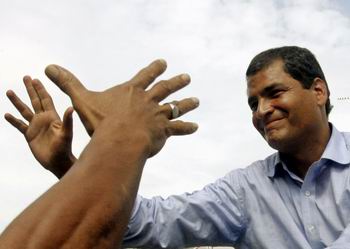 The leftist democratic revolution continues in South America. The 43-year old Rafael Correa was pronounced winner of Sunday’s Ecuadorian run-off election. Correa held 57 % of the vote after 96 % of ballot boxes had been tallied. His rival, the banana magnate Alvaro Noboa has refused to accept defeat and has threatened to challenge the election result. However Correa’s victory was confirmed by one of Ecuador’s seven Supreme Electoral Tribunal judges Narciza Subia who said “Rafael Correa is the new president of Ecuador. The trend is not going to change.”
The leftist democratic revolution continues in South America. The 43-year old Rafael Correa was pronounced winner of Sunday’s Ecuadorian run-off election. Correa held 57 % of the vote after 96 % of ballot boxes had been tallied. His rival, the banana magnate Alvaro Noboa has refused to accept defeat and has threatened to challenge the election result. However Correa’s victory was confirmed by one of Ecuador’s seven Supreme Electoral Tribunal judges Narciza Subia who said “Rafael Correa is the new president of Ecuador. The trend is not going to change.”Correa celebrated in his home town by saying "the people have given us a clear mandate, with the second-largest margin in the last 30 years of democracy”. He will now push for reforms which include re-negotiating debt agreements, opposing a US free-trade pact and re-writing the constitution. Correa says the constitutional rewrite is needed to bypass a corrupt congress and curb political party influence in the courts. As it stands, opposition parties can appoint sympathetic judges to the electoral and supreme courts to stymie Correa. Political tumult is the norm in Ecuador and there have been 11 presidents in the last decade, three of whom were overthrown by politically-motivated lawmakers.
Correa, a trained economist describes himself as "left-wing - not from the Marxist left, but rather a Christian left". He was born in Ecuador’s largest city Guayaquil in 1963. He studied economics in Guayaquil Catholic University and gained his Masters' degrees in Belgium. By 2001, he gained a second masters and a doctorate in economics from the University of Illinois in the US. He is married with three children and is fluent in four languages: Spanish, English, French and Quechua. Quecha is the local indigenous language which Correa learned while doing volunteer work in his student days.
In 2005, Ecuador was plunged into a constitutional crisis after President Lucio Gutiérrez was driven from power by a 60-2 vote in Congress. He was replaced by Alfredo Palacio who appointed Correa as his finance and economy minister. However Correa only last four months in the job. During this time he tried to push through a program of poverty reduction and economic sovereignty. But he made powerful enemies when he defied IMF advice and publicly questioned the wisdom of a free trade agreement with the US. He thumbed his nose at the World Bank when he wound up a government debt reduction fund against their wishes as part of a program of measures to redistribute Ecuador's oil wealth more equitably. The Bank promptly cancelled a scheduled loan of US$100 million tied to maintenance of the fund. Correa turned to his friend Hugo Chavez for help. Palacio forced Correa to resign under intense pressure from the US. The official reason was due to his alleged failure to consult about the sale of US$300 million of sovereign debt to Venezuela. Correa claimed in his resignation letter that Palacio was aware of the sale. After quitting the ministry, he became economics professor at the San Francisco University of Quito. Meanwhile he founded his own party Alianza PAIS and prepared for this year’s presidential election.
 In the first round of voting in October, Correa picked up 23% of the vote which left him second behind Noboa who picked up 27%. But Correa comfortably won the run-off due to his considerable personal appeal and enthusiastic campaign. He appeared at rallies brandishing a leather belt (correa is the Spanish word for belt) to show how he would deal with corruption. His campaign slogan was "dale correa" (give them a belting). Alianza PAIS did not run any other candidates in the election and Correa now plans to seek a referendum to rewrite the constitution and restructure Congress. He attacked Ecuador's Congress as a "sewer" of corruption and will rely on the support of the Ecuadorian Socialist Party to push his reforms through the parliament.
In the first round of voting in October, Correa picked up 23% of the vote which left him second behind Noboa who picked up 27%. But Correa comfortably won the run-off due to his considerable personal appeal and enthusiastic campaign. He appeared at rallies brandishing a leather belt (correa is the Spanish word for belt) to show how he would deal with corruption. His campaign slogan was "dale correa" (give them a belting). Alianza PAIS did not run any other candidates in the election and Correa now plans to seek a referendum to rewrite the constitution and restructure Congress. He attacked Ecuador's Congress as a "sewer" of corruption and will rely on the support of the Ecuadorian Socialist Party to push his reforms through the parliament.Oil is Ecuador’s major export and fifty percent of Ecuador's national budget is funded by petroleum earnings. Indigenous tribes of Ecuador are fighting for land rights, which have been jeopardised for over two decades years by Texaco and Ecuador's state-run company Petroecuador drilling in the Amazon rainforest Eastern part of the country. Correa said he would renegotiate contracts with foreign oil companies to raise the state’s share of crude oil volume. With the addition funds, Correa will prioritise social and infrastructure spending over paying off the country's $10 billion foreign debt.
No comments:
Post a Comment